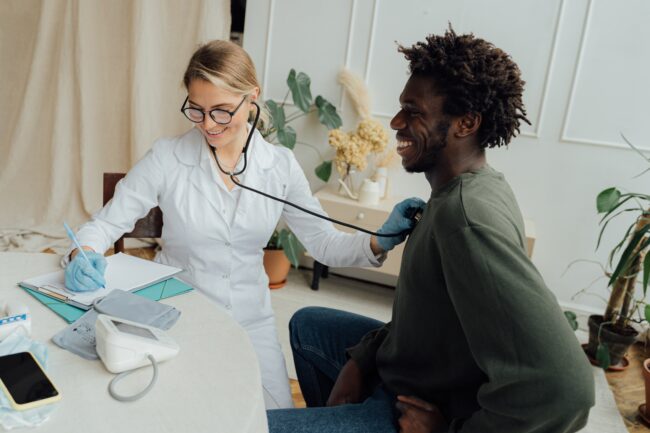The circulatory system moves oxygen, nutrients, and waste through your body. While your veins and arteries are good at what they do, factors like illness, certain bad habits, and natural wear and tear can disrupt their work. So, here’s what you can do to keep your circulatory system healthy (and what can happen if you don’t).
How the circulatory system works
First, we should discuss how the circulatory system functions. Also known as the cardiovascular system, the circulatory system transports nutrients, oxygen, and hormones throughout your body and removes waste products from cells.
Your arterial system (made up of arteries and capillaries) receives nutrient and oxygen-rich blood from the heart and carries it through to every cell in your body. Your vascular system, on the other hand, is made up of veins and venules, which carry the deoxygenated blood to the heart. The veins also pass through your kidneys, which clean the blood.
Your deep veins and arteries are the ‘highways’ connecting to your heart, and your capillaries and venules connect individual cells to these highways.
Why keeping your circulatory system healthy is so important
The health and good function of your arteries and veins is crucial to your overall health. Disruptions in the system can lead to your blood not flowing as it should and your tissues not getting the nutrients they need.
In the short term, this can lead to muscle cramps, swelling, and cold hands and feet, even in hot weather.
But in the long term, it could develop into:
- Stasis Dermatitis. This is a condition stemming from poor circulation around your skin tissues. Without the nutrients, oxygen, and waste removal work your blood does, your skin hardens and thickens, and becomes prone to injury, infection, and even ulcers.
- Deep Vein Thrombosis. DVT involves a blood clot forming in one of your deep veins, usually due to an obstruction or an injury. The DVT can obstruct blood flow even further. And it can also detach from the vein wall and travel into your heart or lungs, causing a pulmonary embolism. With DVT, you might experience pain, cramping, swelling, warmth in the affected area, and shortness of breath. If you start experiencing these symptoms, seek medical attention immediately.
- Varicose Veins. This condition starts with your vein walls weakening and your valves malfunctioning. As a result, your blood can’t reach the heart as easily and instead starts pooling inside the vein, causing it to bulge, twist, and agitate surrounding tissue. Similar to PAD, varicose veins can cause aches, cramps, and shiny skin. They can also result in swelling, skin discolouration, and burning sensations.
How to take better care of your veins and arteries
Fortunately, there are some steps you can take to keep your circulatory system healthy.
- Eat a healthy diet. Eat plenty of Vitamin D, C, and E, flavonoids, fibre, and omega-3 fatty acids. All these nutrients are in fruits, veggies (especially leafy greens), eggs, fish, nuts, and whole grains.
- Wear compression socks. they boost circulation in your legs and facilitate venous return (that is, the rate at which your blood returns to your heart). They’re especially good for strenuous workouts and long flights when your veins can use a little extra help.
- Get plenty of exercise. Walking, swimming, and Yoga are all fantastic options for boosting your circulation without overstraining your veins.
- Elevate your legs. The veins in your legs work overtime to get blood past the gravitational pull. That’s why we recommend elevating your legs above heart level for a few minutes a day; it gives your veins a much-needed break.
- Minimise alcohol intake. Having a couple of drinks on occasion is perfectly fine, but frequent imbibing takes a toll on your circulatory system. Alcohol makes your arterial walls relax and blood pressure increase, making it difficult for your veins to keep up with the blood flow. Over time, valves may fail, walls expand, and you get bulging veins in your legs.
- Stop smoking. Smoking breaks down the slippery lining of your blood vessels, making it more likely for blood to stick, clot, and cause roadblocks or dangerous DVTs.
- Move, don’t stand. Standing desks may be better for your back, but they aren’t necessarily good for your veins. The best way to work in an office setting is to alternate between standing and sitting and to take breaks to walk around every ~30 minutes.
In short

Patient in a consultation with a doctor
Your circulatory system keeps your body healthy and functioning properly. While it’s good at its job, there are some steps you should take to make sure things stay that way. And if you feel there’s something wrong, seek specialist advice. At The Vein Institute, we specialise in treating varicose veins and can diagnose other vascular disorders.
Call us on 04 2010 2637 or fill out this form to book an appointment.
See more facts about veins: Answering Your Vein FAQs

